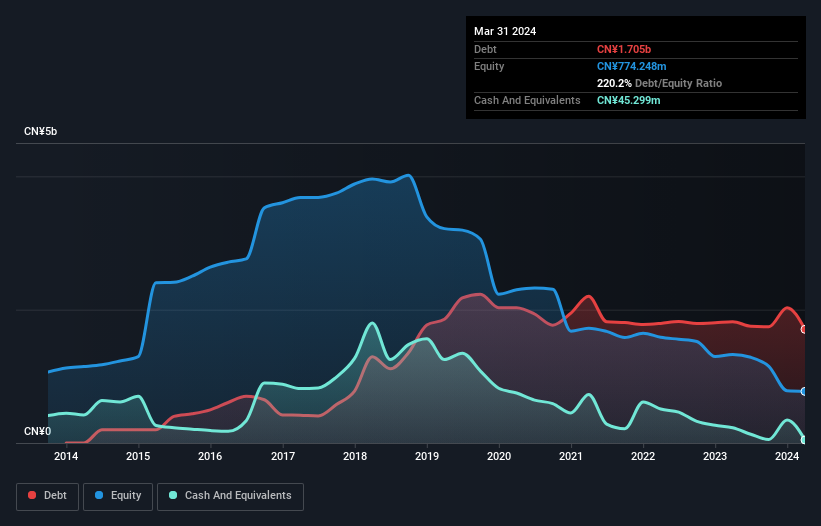Here's Why Hybio Pharmaceutical (SZSE:300199) Can Afford Some Debt

The external fund manager backed by Berkshire Hathaway's Charlie Munger, Li Lu, makes no bones about it when he says 'The biggest investment risk is not the volatility of prices, but whether you will suffer a permanent loss of capital.' When we think about how risky a company is, we always like to look at its use of debt, since debt overload can lead to ruin. Importantly, Hybio Pharmaceutical Co., Ltd. (SZSE:300199) does carry debt. But the more important question is: how much risk is that debt creating?
Why Does Debt Bring Risk?
Debt and other liabilities become risky for a business when it cannot easily fulfill those obligations, either with free cash flow or by raising capital at an attractive price. Ultimately, if the company can't fulfill its legal obligations to repay debt, shareholders could walk away with nothing. While that is not too common, we often do see indebted companies permanently diluting shareholders because lenders force them to raise capital at a distressed price. By replacing dilution, though, debt can be an extremely good tool for businesses that need capital to invest in growth at high rates of return. The first thing to do when considering how much debt a business uses is to look at its cash and debt together.
See our latest analysis for Hybio Pharmaceutical
What Is Hybio Pharmaceutical's Net Debt?
As you can see below, Hybio Pharmaceutical had CN¥1.71b of debt at March 2024, down from CN¥1.82b a year prior. On the flip side, it has CN¥45.3m in cash leading to net debt of about CN¥1.66b.

A Look At Hybio Pharmaceutical's Liabilities
We can see from the most recent balance sheet that Hybio Pharmaceutical had liabilities of CN¥1.03b falling due within a year, and liabilities of CN¥1.19b due beyond that. On the other hand, it had cash of CN¥45.3m and CN¥184.3m worth of receivables due within a year. So it has liabilities totalling CN¥1.99b more than its cash and near-term receivables, combined.
This deficit isn't so bad because Hybio Pharmaceutical is worth CN¥8.56b, and thus could probably raise enough capital to shore up its balance sheet, if the need arose. But we definitely want to keep our eyes open to indications that its debt is bringing too much risk. When analysing debt levels, the balance sheet is the obvious place to start. But it is Hybio Pharmaceutical's earnings that will influence how the balance sheet holds up in the future. So when considering debt, it's definitely worth looking at the earnings trend. Click here for an interactive snapshot.
In the last year Hybio Pharmaceutical had a loss before interest and tax, and actually shrunk its revenue by 43%, to CN¥405m. That makes us nervous, to say the least.
Caveat Emptor
While Hybio Pharmaceutical's falling revenue is about as heartwarming as a wet blanket, arguably its earnings before interest and tax (EBIT) loss is even less appealing. Indeed, it lost CN¥371m at the EBIT level. Considering that alongside the liabilities mentioned above does not give us much confidence that company should be using so much debt. Quite frankly we think the balance sheet is far from match-fit, although it could be improved with time. Another cause for caution is that is bled CN¥18m in negative free cash flow over the last twelve months. So suffice it to say we do consider the stock to be risky. There's no doubt that we learn most about debt from the balance sheet. But ultimately, every company can contain risks that exist outside of the balance sheet. For instance, we've identified 2 warning signs for Hybio Pharmaceutical (1 makes us a bit uncomfortable) you should be aware of.
If you're interested in investing in businesses that can grow profits without the burden of debt, then check out this free list of growing businesses that have net cash on the balance sheet.
Valuation is complex, but we're here to simplify it.
Discover if Hybio Pharmaceutical might be undervalued or overvalued with our detailed analysis, featuring fair value estimates, potential risks, dividends, insider trades, and its financial condition.
Access Free AnalysisHave feedback on this article? Concerned about the content? Get in touch with us directly. Alternatively, email editorial-team (at) simplywallst.com.
This article by Simply Wall St is general in nature. We provide commentary based on historical data and analyst forecasts only using an unbiased methodology and our articles are not intended to be financial advice. It does not constitute a recommendation to buy or sell any stock, and does not take account of your objectives, or your financial situation. We aim to bring you long-term focused analysis driven by fundamental data. Note that our analysis may not factor in the latest price-sensitive company announcements or qualitative material. Simply Wall St has no position in any stocks mentioned.
Have feedback on this article? Concerned about the content? Get in touch with us directly. Alternatively, email editorial-team@simplywallst.com
About SZSE:300199
Hybio Pharmaceutical
Engages in the development, manufacture, and commercialization of therapeutic peptides API and peptide-based drugs in China and internationally.
Imperfect balance sheet with weak fundamentals.

